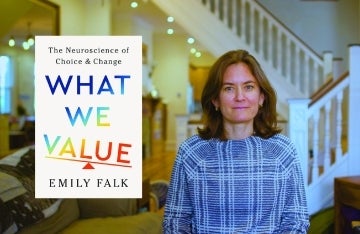Psychologist and Neuroscientist Emily Falk to Lead APPC’s New Climate Communication Division
Falk studies behavior change, persuasion, and how ideas and behaviors spread.

As part of its 30th anniversary celebration, the Annenberg Public Policy Center (APPC) has opened a new area of research, the Climate Communication division, led by Annenberg School for Communication vice dean Emily Falk.
“This moves the policy center into an important new area in which communication plays a critical role,” said APPC director Kathleen Hall Jamieson.

The new climate division joins APPC’s Communication Science and Institutions of Democracy divisions, which are headed, respectively, by Penn Integrates Knowledge Professor Dolores Albarracín and political science professor Matt Levendusky.
Falk, a professor of communication, psychology, marketing, and operations, information and decision at the Annenberg School, directs Penn’s Communication Neuroscience Lab and studies the science of behavior change, using tools from psychology, neuroscience, and communication to explore the characteristics of persuasive messaging, and successful communication more broadly. She has been recognized as an outstanding early-career researcher by the International Communication Association, the Association for Psychological Science, the Society for Personality and Social Psychology, the National Institutes of Health, and the Defense Advanced Research Projects Agency.
The Climate Communication division is envisioned as a hub for interdisciplinary, translational research on climate communication and the neural, psychological, and sociological mechanisms that motivate climate action. Its work will focus both on topics at both local scales (for instance, environmental justice initiatives in West Philadelphia) and global scales (such as the development and evaluation of media campaigns that communicate climate science knowledge).
“We’re hoping to bring together people from across Penn, the local community, nationally and internationally to create cutting-edge science about climate communication,” Falk said. She added that two areas were of special interest.
“One is focusing on the beliefs, attitudes, and behaviors relevant to climate in areas such as transportation, food, and energy,” she said. “The second is resilience and social connection. We’re particularly interested in working with young people to create the tools and psychological resources they need to innovate and develop new ways of thinking about climate and address the challenges we face as a global community.”
Falk said the division would collaborate closely with other research centers at Penn, including the Penn Center for Science, Sustainability, and the Media, under the leadership of Michael Mann, and her own Communication Neuroscience Lab.



